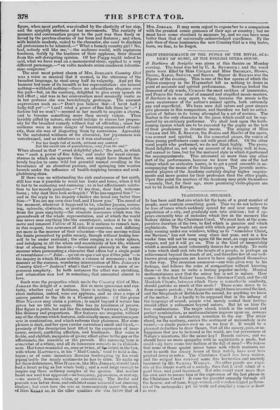FIRST PERFORMANCE OF THE PUPILS OF THE ROYAL ACA. DEWY OF MUSIC, AT THE ENGLISH OPERA-HOUSE.
Ii Barbiere di Seviglia was given at this theatre on Monday evening. The band was led by C. A. SEYMOUR ; and the vocal parts were filled by Miss CHILDE and Miss BROMLEY, Messrs. BRIZZI, SAPIO, SEGUIN, and SMITH. Signor de BEGNIS was the Figaro of the evening. This is one of the few operas of which the Italian company in the Haymarket left us nothing to desire in point of accurate and spirited performance. Soerracs looked the demurest of sly wards, CURIONI the most reckless of inamoratas, and PORTO the beau ideal of amazed and stupified music-masters. Ii Barbiere is an easy opera to sing, because the music is the mere exuberance of the author's animal spirits, both extremely gay and superficial. We have seen dull actors and poor singers give pleasure in this composition, and therefore we had no anticipation of failure in its being attempted by a set of novices. The Barber is the only character in the piece which could not be supported by an ordinary performer. We shall look upon the forthcoming operas which are to be executed by the pupils as the test of their proficiency in dramatic music. The singing of Miss CHIME and Mr. E. SEGUIN, the Rosina and Basilio of the opera, was correct and spirited. In the concerted pieces, the voices of these young performers came out with great effect. Of the other vocal pupils who performed, we do not think highly. The young Band delighted us, not only on account of its being well in tune, and correct in time, hut for the matured style in which it performed the accompaniments. This interested us more than any other part of the performance, because we know that one of the last things which an orchestra learns, is to get a good ensemble in accompanying the music of the Italian opera. The juvenile instrumental players of the Academy certainly display higher acquirements and more genius for their profession than the other pupils. Upon this point the masters of the Academy may pride themselves —namely, that, for their age, more promising violin-players are not to be found in Europe.














 Previous page
Previous page